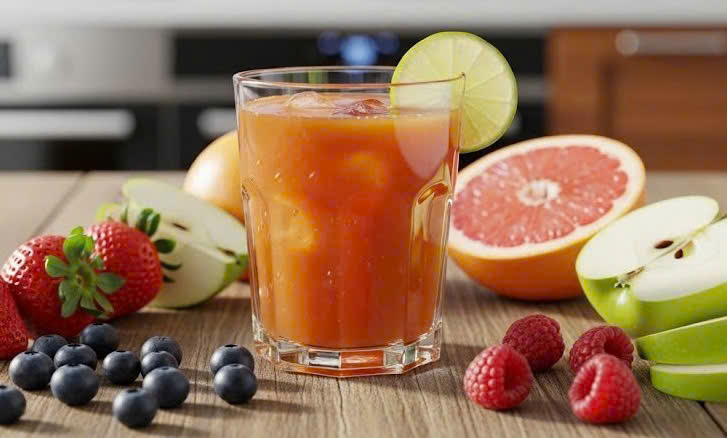Fruit provides many vitamins, minerals, antioxidants, and soluble fiber that support the immune system, reduce inflammation, and protect cardiovascular health. However, juicing removes most of the fiber, concentrating the natural sugars (fructose) and causing the glycemic index (GI) to rise faster than eating whole fruit.
Doctor Dao Thi Yen Thuy, Head of the Diet and Nutrition Department at Tam Anh General Hospital in TP HCM, advises people with high blood sugar to choose fruits with a low glycemic index, such as strawberries, blueberries, oranges, grapefruits, and green apples. They should limit high-sugar fruits like ripe mangoes, grapes, and durian. People with diabetes should drink no more than 100-150 ml of juice and avoid it in the morning on an empty stomach, as this can cause blood sugar to spike. Drinking juice after main meals or combining it with foods rich in protein and healthy fats can slow down sugar absorption. Don't completely remove the fruit pulp, as the fiber in it helps control blood sugar.
 |
People with high blood sugar should choose low-sugar fruit juices. Photo: Trong Nghia |
Avoid mixing fruit juice with sugar, condensed milk, syrup, or honey, as these add carbohydrates, making blood sugar control difficult. Bottled juices often contain added sugar and preservatives, making them unsuitable for people with diabetes. It's better to make juice at home and drink it immediately after preparation to minimize vitamin and nutrient loss.
The effect of fruit juice on blood sugar varies from person to person. Individuals with high blood sugar, HbA1c (average blood sugar level over 2-3 months) exceeding treatment targets, or those taking blood sugar-lowering medication or insulin should be cautious, as excessive juice consumption can cause significant blood sugar fluctuations, making the disease harder to manage.
Before adding fruit juice to their diet, Doctor Yen Thuy recommends that patients consult a nutritionist or their doctor for advice on suitable fruits. Maintaining a balanced diet, limiting refined carbohydrates, exercising regularly, and getting regular blood sugar checks are essential to prevent heart, kidney, eye, and nerve complications from diabetes. Supplementing with natural extracts like GDL-5 from South American sugarcane, containing natural policosanol, can help regulate blood lipids and contribute to preventing cardiovascular disease in people with diabetes.
Trong Nghia
| Readers can submit nutrition-related questions here for doctors to answer. |












